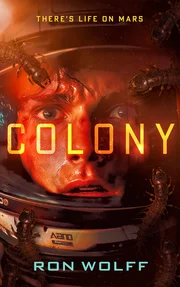
The Hellas Station is a trailblazing Mars colony staffed by only a handful of international, highly competent astronauts. One of these exceptional colonists is extra-special: Adam Flynn is the first human born on Mars (sadly, his mother died from cancer in the radiation-rich environment). Seventeen-year-old Adam has matured to be a survival-hardened and resourceful youth who has helped to ready Hellas Station for an influx of nearly 100 new settlers, all of whom are on a long, one-way trip and expect to spend the rest of their lives on the red planet. But Adam is emotionally unprepared for the arrival of the group, which includes 25 more young people, many of them genius-level high-achievers. They all know Adam’s story (unbeknownst to him, the first “Martian” boy is a celebrity figure on Earth) and treat him with a blend of curiosity and disdain. The military commander of the newcomers, Col. Griggs, is a glory-seeking, aggressive type (with two not-so-nice teenagers of his own) who usurps the authority of the established colonists and is particularly condescending to Adam, insisting he is just a “kid” and ignoring hisadvice on all matters Martian. Things begin to go badly: Adam notices an especially powerful dust storm bearing down on the complex, and the installation’s power failures are traced to a frightening infestation by a hitherto-unsuspected Martian life form. At first appearing as dark patches or tiny larvae, the marauders turn out to be countless beetlelike insects. Of course, Col. Griggs and his Earth allies vainly perceive the discovery of life on another planet as an opportunity for naming rights, and as a new potential food source. Adam, on the other hand, figures out quickly that it is the humans who are on the menu.
The first-person-narrated story begins on a note recalling Andy Weir’s popular novel The Martian (2011), sharing an emphasis on the hard science of exoplanet survival skills and making the most of limited resources, with the added YA-friendly perspective of a teen hero with a (very) circumscribed upbringing abruptly coming to terms with having other humans around who are his own age, particularly of the macho-jock and mean-girl sort. (Whatever raging-hormones youthful romance happens here is dialed considerably down.) At around the midway point, with the onslaught of the bug menace, things take a more Hollywood action-movie turn, which is ironic considering how frequently the youthful characters reference celluloid SF (especially 1986’s Aliens) and deny that their plight resembles hack scriptwriting: “If this were a movie, I’d grin triumphantly and say something clever. She’d laugh and give me a fist-bump. Except my life doesn’t seem to be shaping into that kind of movie.” Actually, that really is more or less what transpires, with Adam and select others doing superheroic acts in an oxygen-starved atmosphere and facing off against unimaginable hordes with the most meagre homebrew weaponry while tossing off courageous asides. There is gruesome gore and a shocking body count, underlying the message that haughty grown-ups should give more credence to precocious astro-kids, especially when it comes to monsters.


